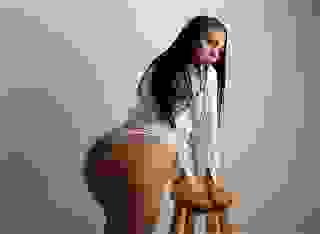Note: You can change font size, font face, and turn on dark mode by clicking the "A" icon tab in the Story Info Box.
You can temporarily switch back to a Classic Literotica® experience during our ongoing public Beta testing. Please consider leaving feedback on issues you experience or suggest improvements.
Click here"And this is Georgeanna Wilkes," Nora continued, gesturing toward a chair where Carina sat, "representative of our anonymous seller."
Carina rose from the chair, flashed me a pleasant smile, and extended her hand. If she were surprised to see me, she didn't show it.
"Mr. Weber," Carina said in a clipped British accent. "Very pleased to meet you."
I was surprised she'd chosen to serve as her own liaison to the gallery. It dramatically increased her exposure. Most forgers preferred absolute anonymity. Then again, Carina never lacked for confidence in her abilities.
"Nice to meet you, Ms. Wilkes," I replied, taking her hand. "You're from England?"
"Wales, actually."
"You don't say? I've always wanted to make it over to Carmarthenshire to see St. David's Cathedral."
"Oh, it's certainly worth the trip," Carina replied. "Though I'm afraid you won't have much luck in Carmarthenshire county. St. David's is in Pembrokeshire."
"Of course. My mistake," I said, doing my best imitation of an embarrassed grin.
Nora had given me a few details about the seller, so I'd had a chance to brush up on my geography. Carina had sidestepped my trap effortlessly. Either she had also done her homework, or she'd been faking her American accent and not her Welsh one.
We all took seats around the ornate conference table. I placed a manila envelope in front of me. Carina glanced at it.
"Forgive me if this sounds rude, Mr. Weber," Carina said, "but I have to confess that I'm a bit confused why you're here."
"There's no easy way to say this, Ms. Wilkes. But I'm afraid the owner of the Modigliani you're selling is trying to pass off a forgery."
Lauren snorted derisively. "You're unbelievable," she said.
Carina feigned shock. "That's quite an accusation, Mr. Weber. I wasn't aware you'd been given an opportunity to examine the painting," she said, glaring at Nora.
"He wasn't," Nora replied, making no attempt to hide her irritation at Carina's accusation.
"He doesn't know what he's talking about," Lauren said. "I'm the only one to examine that painting. And it passed with flying colors. Not a single anachronistic pigment."
"Did you date the frame?" I asked.
"What?"
"The wood. Did you date it?"
Lauren shot a furtive glance toward Nora, then collected herself and spoke as though she were composing an essay.
"Given the results of the pigmentation analysis and the provenance, I didn't feel it was necessary in this case to..."
"It's necessary in every case," I said, my words dripping with disdain.
"Synthetic fibers?" I continued, not giving her a chance to respond. "Did you check to see if anything was embedded in the paint that didn't belong there?"
"Of course. I always spot check for..."
"How many spots did you check?"
"This is ridiculous."
"Why? I'm sure you mapped a grid and marked off each segment you checked so that you could calculate a specific percentage. I mean, not doing so with a work of this importance would constitute gross negligence. So, what percentage of the grid did you spot check?"
"Fuck you, Adam."
An awkward silence followed. I let it linger and fought hard to suppress a smile.
"Do you have any evidence to support your claim, Mr. Weber?" Nora asked. "Or are you merely here to settle old scores? For your sake, I hope it's not the latter."
"He doesn't have a shred of evidence," Lauren said.
"I'm afraid that's yet another example of your poor attention to detail," I said. "You showed me a photograph of the painting's owner eating his breakfast, remember? You were even kind enough to let me take a snapshot." I pulled four copies of the photo from my manila envelope and passed them around.
"As I've explained to Ms. Turner, the man in this photograph isn't the original owner," Carina said. "He bought the portrait on a trip to Paris from a landlord who rented to Modigliani. When he returned to New York, he hung it in his home as a joke. He thought the elongated neck looked funny.
"He and my client's great-grandfather were business acquaintances, and both the painting and the photo changed hands as part of a gentlemen's agreement to settle some old debts. It's been in my client's family ever since, but only recently did they come to realize its value. Understandably, they'd like to avoid the attention that comes with such a find, so they've chosen to remain anonymous."
"Did the man in this photograph have a name?" I asked.
"I'm quite sure he did, Mr. Weber," Carina said, a hint of irritation creeping into her voice. "Most people do. But we haven't found a record of it."
"Of course not."
I turned to Lauren. "And what did your undoubtedly meticulous analysis of the photo reveal?"
Lauren glanced again at Nora. This time she answered with confidence, proudly rattling off a series of rapid-fire facts.
"Black-and-white photo measuring 2-1/4 by 3-1/4 inches. Taken with a Kodak Brownie 2 and developed in a darkroom. Demonstrates wear markings consistent with a photograph of its age. Subject in photo is wearing period clothing. Furniture and dinnerware is also period appropriate. Oh, and the subject is holding a newspaper with the fucking date on it."
"I always thought that was a little on-the-nose, too," I said. "I'm glad you agree."
"What?" she said, perplexed at my response to her trump card.
"The newspaper. Held just so. Allowing us to see just enough of the front page and masthead to determine the date: June 13, 1919. Almost as if it were staged."
She laughed. "It's staged because of the way he's holding the newspaper? That's pathetic, Adam, even for you."
"Did you know you can buy rare and vintage newspapers?" I said, ignoring her. "It's a niche market. Not many places sell them. So, I called them all."
I glanced at Carina. Her face was expressionless.
"I told them I was looking for a copy of the New York Times from June 13, 1919. Most said they didn't have it. But do you know what one gentleman in Seattle told me? He said, 'That's amazing. We've never had a single request for that date, and now we've had two almost back to back.' He told me someone else bought one six months ago."
I turned to Nora. "Ms. Turner, my memory isn't what it used to be. Remind me, when did you say this Modigliani came into your gallery's possession?"
"Five months ago."
"What a fascinating coincidence," I said.
"A coincidence is hardly proof that the photo is staged, Mr. Weber," Carina said.
"Very true, Ms. Wilkes. Very true," I said, standing up. "However, there's something else odd about this photograph." I walked to her seat and pointed to a spot on the photo she was holding.
"Notice the face of the grandfather clock," I said.
"It says 8:05," Carina said.
"What's odd about that?" Lauren asked.
"Nothing at all. I think we'd all agree 8:05 a.m. is a perfectly reasonable time to be eating breakfast. Would we not?" I looked at each of the women in turn to make clear that my question was not rhetorical.
Nora nodded. Lauren shrugged. Carina didn't move.
"It's not the time that strikes me as odd," I continued. "It's this."
I pointed to the face of the grandfather clock with the tip of my pen. "This grandfather clock has what's called a moon dial. It's hard to see in the original photo without magnification, so I've taken the liberty of enlarging it and making a few copies."
I pulled the enlargements from the envelope and walked them around the room. As I did so, I gave Carina a wink.
"As the name implies, the moon dial displays the current phase of the moon. The dial is calibrated to make one half turn every 29.5 days, the length of the lunar cycle."
"About the length of time you've been talking, Mr. Weber. Would you please get to the point?" asked Nora.
"Of course. The handy thing about the moon and the stars is that they move through the sky like..." I tapped the photo. "Well, like clockwork. You can work backward to calculate the phase of the moon on almost any given date, even one more than 100 years ago. On June 13, 1919, there was a full moon. Which leaves me to wonder, why does the moon dial on this particular clock show a waning crescent?"
Silence filled the room. It continued to expand until it felt like there was hardly space to breathe. Carina finally broke it. "This is absurd. That clock could very easily be stopped. Or broken."
"If that were the case," I said, "then why does it show what we've all agreed is a perfectly reasonable time for breakfast?"
I glanced at Lauren and Nora. They were both staring at Carina.
"How should I know?" Carina answered. "It was 100 years ago. Maybe the owner didn't care what phase the moon was in, or maybe he just didn't set the dial correctly."
"I think you've hit the mark, Ms. Wilkes," I said. "Only, I don't think it was the owner of the clock who forgot to set the dial or set it incorrectly. I think it was the forgers."
Carina was right. I really did enjoy delivering bad news.
"Well, I think you're grasping at straws, Mr. Weber. And I further think that if you or this gallery are intent on slandering my client with a false claim of forgery, then we will exercise our rights under the law to seek restitution."
"Stop blathering," said Nora. "You won't be suing anyone. I'm not convinced the painting is a forgery. There's just not enough evidence."
I was stunned. "But, surely you don't still intend to sell this at auction?"
"It's my gallery, Mr. Weber. I'm quite sure I can do anything I want."
I glanced at Carina. She was smiling.
"However," Nora continued, rising from the table, "based on the irregularities surrounding its provenance, I'm also not convinced the painting is an authentic Modigliani. And I'm not about to risk my gallery's reputation on a work I'm not convinced is genuine."
She turned to Carina.
"I'm afraid we'll have to pass on your painting, Ms. Wilkes. We will pull it from the auction and return it to your client, with our thanks for giving us an opportunity to sell it, and our best wishes for finding another gallery better suited to your needs."
Carina's smile had vanished. "You realize, of course, that once you pull it, every gallery in the world will treat it like it's a forgery, even if you don't claim it be one."
"Influential as I may be, I'm afraid I haven't yet acquired the ability to control how other owners choose to run their galleries, Ms. Wilkes. Good day."
With that, Nora swept from the room as quickly and purposefully as she had entered it.
*******
A month later, I had almost finished packing up my lab. It was surprisingly emotional. I'd started this business from scratch, and I'd made a lot of memories in this building, some pleasant and others not so pleasant. It was a part of me, and it was hard to leave it behind.
My job as head of forensic research at the Kiefer Gallery started next week. Nora had offered me the position just a few days after our meeting. Apparently, our little get together had convinced her of the wisdom of expanding the department. She was eager to bring in someone from outside the gallery, as she'd recently lost confidence in the abilities of her in-house staff.
Nora told Lauren she was welcome to stay on as my direct report. Surprisingly, Lauren refused that generous offer and resigned immediately. When he heard I had taken the job, Preston seemed to decide it was time to move on to greener pastures, too. I'd heard he had left New York, and Lauren, for a fresh start in San Francisco. It's always a shame to lose good people.
I dropped by Prospect Heights a week or so after our meeting. I didn't expect to find Carina, and was not surprised to learn her brownstone had been vacated for weeks. The place had been rented fully furnished, and the tenant had paid the first year's rent in full. There were still two months remaining on the agreement.
I took a break from packing to scroll through the latest batch of resumes I'd received for Lauren's position. I'd never had an assistant before, and I wanted to be certain I chose the right person. I may be a fine judge of paintings, but I still have a lot to learn when it comes to judging people.
A knock on the door interrupted my work. A FedEx driver had left a large box on the pavement. I carried it to the conference table and opened it. Inside was a painting. There was not an ounce of protective packaging around the frame, and when I slid it from the box, I understood why. It was the Walker that Carina had painted.
Attached to the frame was a handwritten note.
Adam,
I hope this earns a place of honor on your wall.
It's an early work, so it's a bit clumsy. I like to think I've matured a great deal since then. When you look at it, I hope you have fond memories of our time together. I know I do.
It's a shame you never had a chance to examine the Modigliani. I doubt even you would have been able to find a flaw. I guess we'll never know.
That was an impressive bit of work at the Kiefer Gallery, but you caught me on a technicality, so we'll call it a draw.
Given our professions, I'm sure our paths will cross again. When they do, I'm willing to bet you'll never be the wiser.
That said, I hope you prove me wrong. I like surprises.
Carina
I smiled. Still as arrogant as ever. Only Carina could lose millions of dollars and call it a draw.
I glanced at the stack of paintings I'd removed from my office walls and realized that what I'd told Carina that first day hadn't been exactly true. I was a collector. I just happened to collect forgeries.
Every painting in my collection had a story. Carina's painting was my crown jewel, a masterpiece crafted by the da Vinci of forgers, and it had the most interesting story of all. Unfortunately, it was one that I could never share. Only two of us in the world knew the tale. I hoped that, one day, we might have a chance to add another chapter.
*******
Authors Note:
I had only three minor handicaps in writing this story about a forensic scientist who specializes in exposing art forgeries: I know nothing about art, forgery, or forensic science.
I did some research to paper over my ignorance, but those of you more knowledgeable about these subjects may see through the facade. I apologize for any glaring errors.
This story was partially inspired by the real-life forgery saga that brought down the Knoedler Gallery. It's an interesting tale, if you enjoy that sort of thing.
If you made it this far, congrats and thanks for reading. Please consider leaving a comment to tell me what you liked or what you think I need to work on. My goal is to get better, and I sincerely value constructive criticism.
Even better, drop me a line if you'd be willing to beta read for me sometime. I write very, very slowly, so I promise you won't have much work to do.
- COMMENTS
Actually most of the art historical and forensic dialogue is quite convincing. However an important note: "galleries" do not have auctions any more than butcher shops do. Each piece of art has a price tag. You can haggle (almost anyone can get an immediate 10% off) but they don't auction. "Auction houses" hold auctions. A gallery may buy art or even act as the agent for a collector but it does not sell at auction. Ever.
Excellent story! Your work definitely held my interest though the entire read. Thank you for a great effort
Quite a good story I know nothing about art BUT it kept my interest alive Look fwd to parts 2 and 3 (jaybee186)








